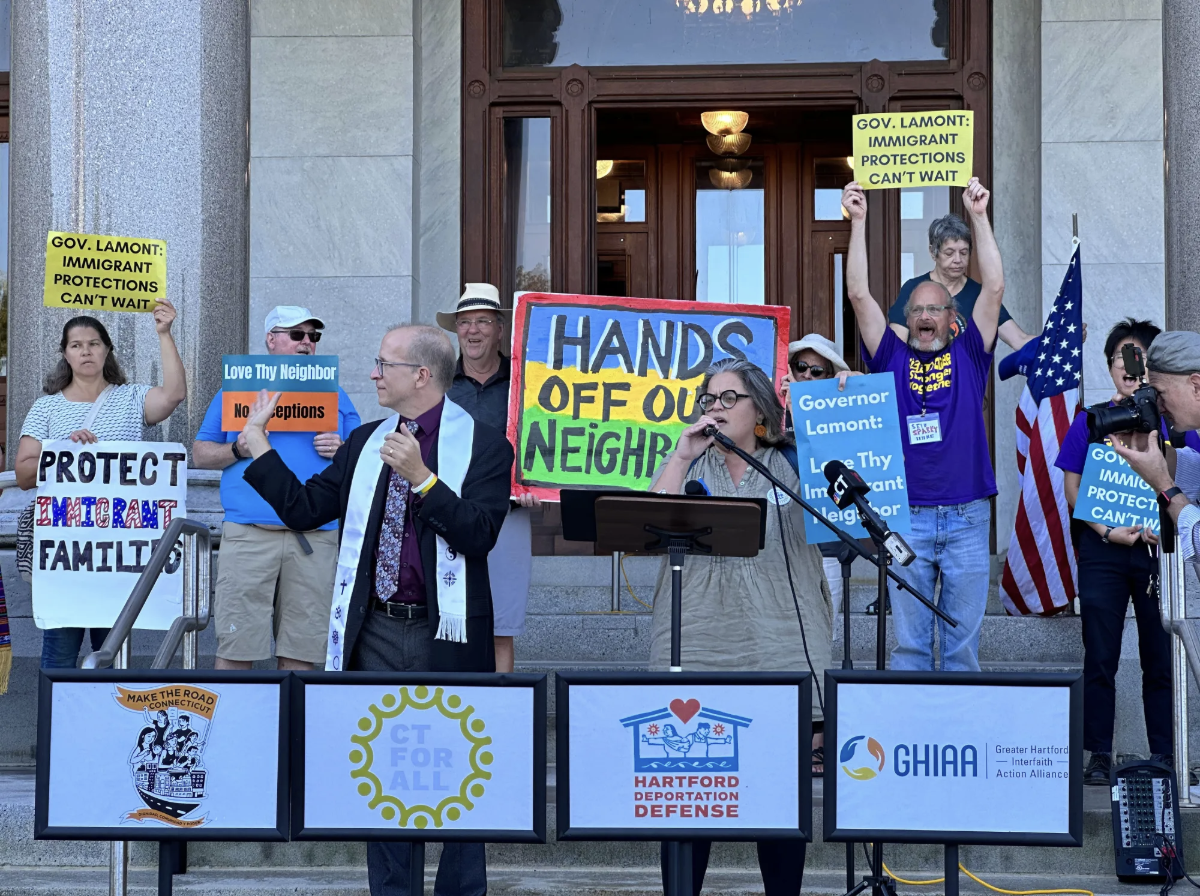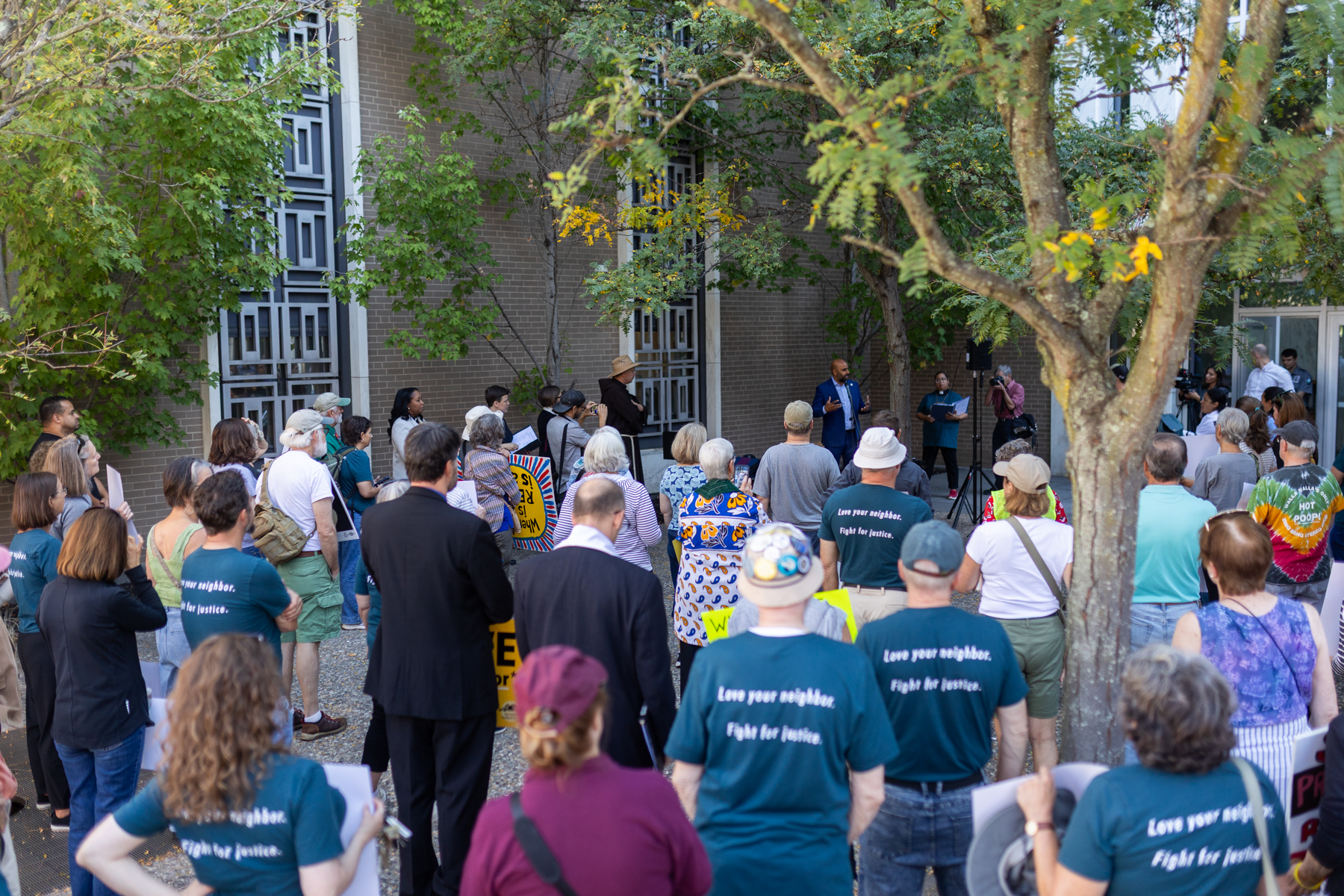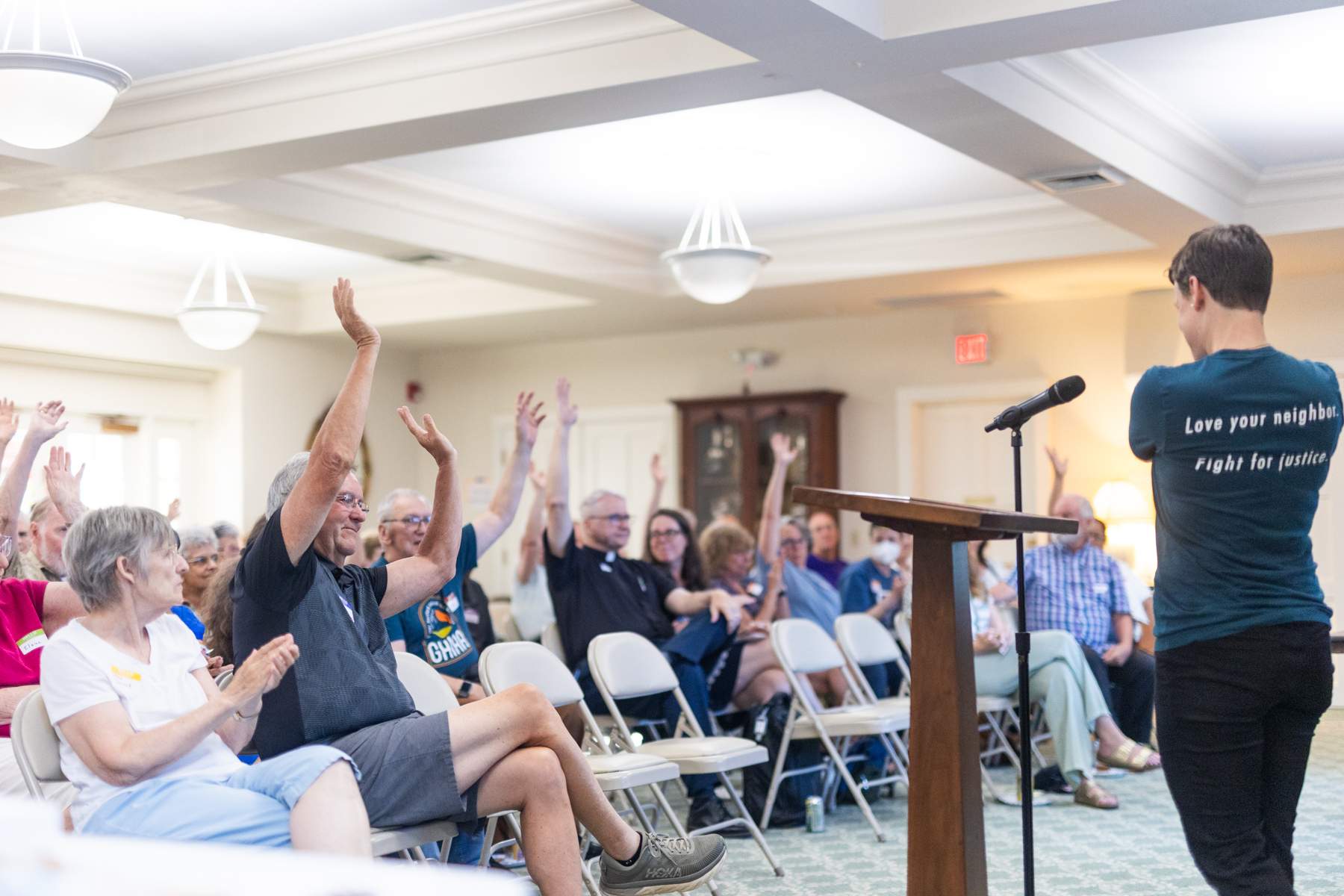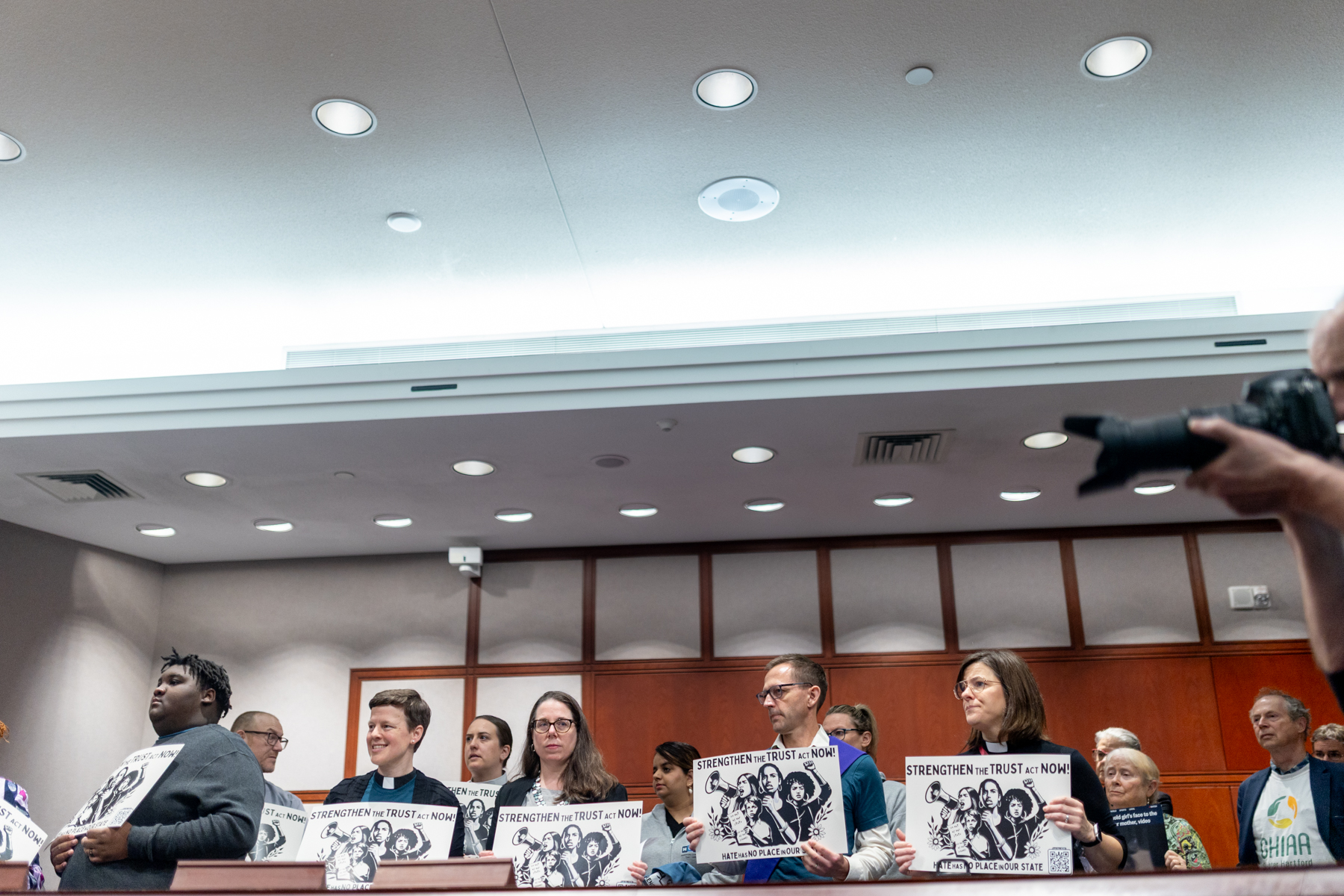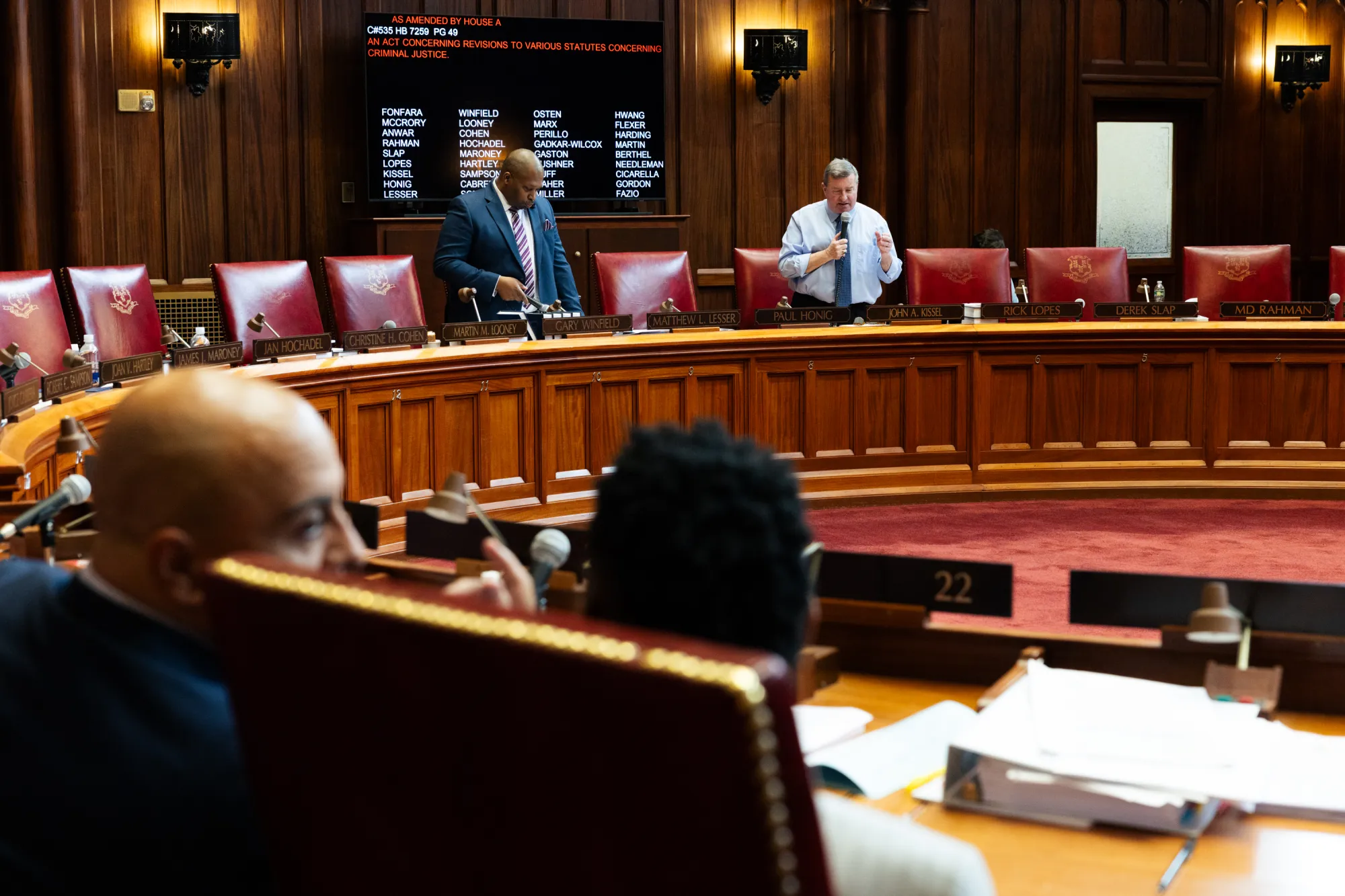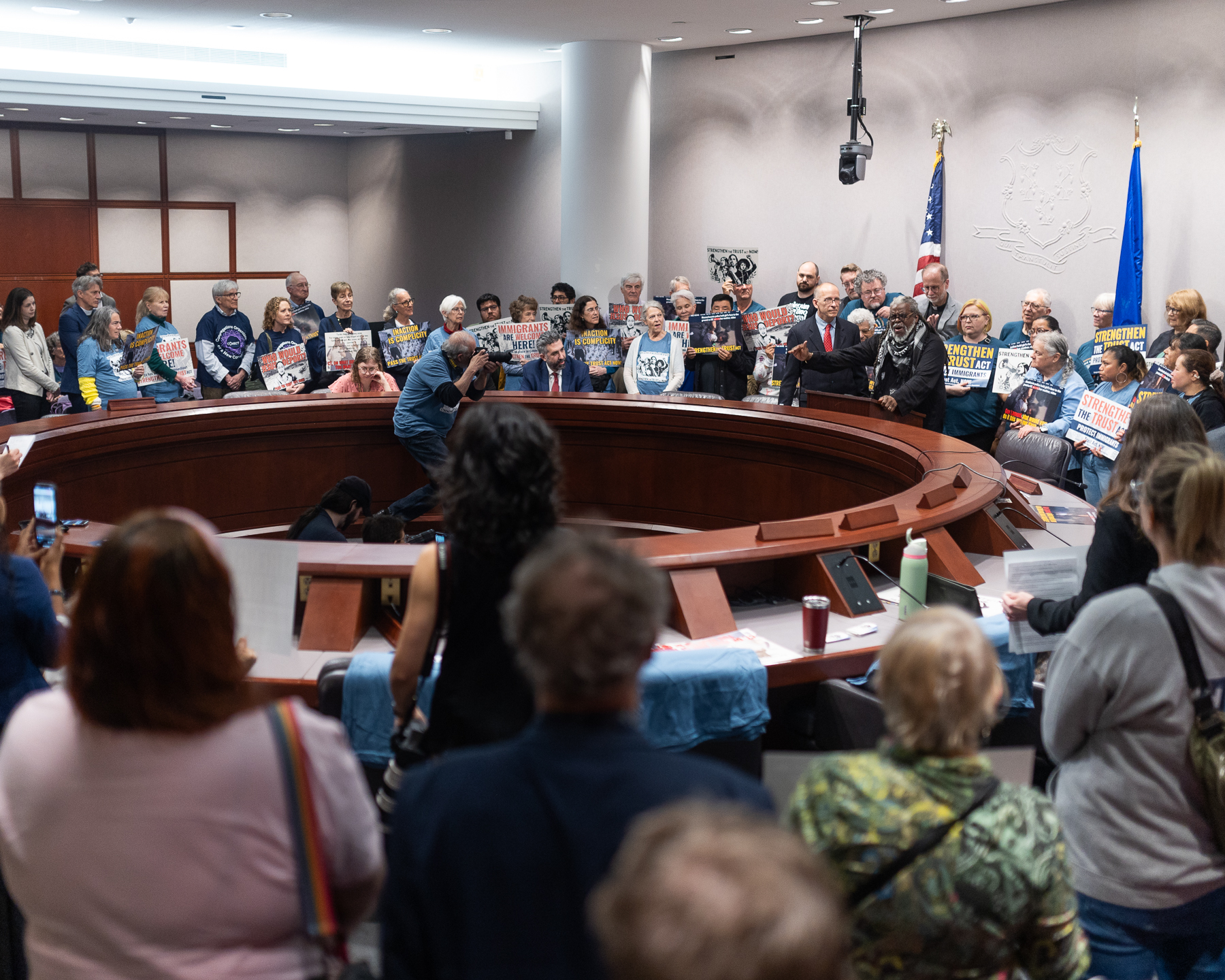by Joshua Eaton, published in CT Insider
Speaking with a half-dozen activists who’d come to the state capitol to lobby, State Rep. Joe Gresko pantomimed as he explained the process lawmakers were going through to negotiate a key piece of legislation.
“You gotta say OK,” the Democrat from Stratford said, pointing animatedly at one of the activists who strained to hear him over the din inside the busy marble-and-granite hallway outside the House chamber Thursday afternoon.
“You gotta say OK,” he repeated, turning to another activist.
“Are you good with it? Oh no, he’s not good with it,” Gresko said as his finger landed on a CT Insider reporter who was shadowing the group of activists. “What do you want to change? You want to change this? OK.”
“He wants to change this,” Gresko said, turning to another member of the group. “Are you OK with it? ‘No, I’m not OK with it.’”
Finally, the lawmaker broke character to drive his point home.
“It’s just a game of telephone,” he said of the current negotiations. “So that’s what’s being done now. They’re very close.”
Gresko was explaining the behind-the-scenes wheeling and dealing over H.B. 7212, which would expand on a 2013 law called the Trust Act that limits how law enforcement in Connecticut can cooperate with federal immigration officials.
The legislature already expanded the bill once, in 2019. The activists Gresko met Thursday were part of the Trust Act Now coalition — a group of faith leaders, immigrant rights activists and progressive advocacy groups who gathered at the capitol to press state lawmakers to strengthen the law once again in the face of a second Trump administration.
The bill’s supporters want protections on what data about immigrants state agencies can share with the federal government and a private right of action that would allow individuals to sue if they think their rights have been violated under the act, among other measures.
Even in a state where Democrats effectively rule state government, however, the legislation has proven divisive.
The bill passed the Judiciary Committee handily late last month and has been waiting for a vote in the House while lawmakers negotiate potential changes and advocates push to shape the final legislation — the process Gresko role played with the activists. Last week, House Speaker Matt Ritter, D-Hartford, told CT Insider the Trust Act is “an important protection that we can make stronger.”
Meanwhile, rumors have swirled in recent weeks that Gov. Ned Lamont might be considering a veto.
Asked last week whether he would sign a Trust Act expansion if lawmakers put one on his desk, Lamont hedged.
“Look, I certainly support strengthening measures,” he said. “I signed the amendment we did just a few years ago to strengthen the Trust Act. I love everything that the Trust Act stands for. Whether we do it through the Trust Act or do it through regulation to make sure that people are safe and feel safe, we’ll work that out with the legislature.”
Then, as advocates gathered at the capitol Thursday to rally support among lawmakers, the governor’s spokesperson confirmed the long-simmering rumors that he is unlikely to support the bill.
“As many of the previous loopholes were closed, he does not believe the law needs to be revised,” spokesperson Rob Blanchard told CT Insider by email Thursday.
For some immigration rights advocates who have been pushing for an expansion to the Trust Act for months, Lamont’s decision to come out publicly against the bill on the coalition’s lobbying day stung.
“I’m not sure what that means for children going to school, if they will feel comfortable going to school. Or people going to their health appointments. We don’t feel confident that people will do those things, and that creates a lot of harm for our community,” said Tabitha Sookdeo, executive director of Connecticut Students for a Dream.
“I’ll say for myself, it makes me feel that I don’t matter, that my community does not matter,” she added.
Two days later, Sookdeo addressed about 40 people at a forum on immigration at the Episcopal Church of St. Paul and St. Jame in the Wooster Square neighborhood of New Haven.
By then, everyone had heard about the governor’s veto threat. But as she spoke, Sookdeo tried to convince the activists and advocates gathered in the ornate sanctuary that the battle wasn’t over.
“Just know that we will continue to fight and we will continue to build power,” she said.
Back in Hartford on Thursday morning, news of Lamont’s statement hadn’t yet reached the faith leaders and advocates. Still, they’d definitely heard the rumors he was wavering.
“God has not given us a spirit of fear,” thundered Bishop John Selders Jr., of Amistad United Church of Christ in Hartford, during a morning press conference that felt, at times, more like a revival.
“Come on, Connecticut,” Selders said. “Come on, Gov. Lamont. Get the courage.”
Behind him stood 40-some-odd faith leaders — a Muslim imam in a knit skullcap called a tagiyah, a Reform rabbi in a sharp blue suit and Christian ministers in stoles and clergy collars, among them a Catholic priest in the simple brown robe worn by Franciscan friars, all alongside immigrant rights organizers in powder blue T-shirts that read “Hate Has No Place in Our State” and “Strengthen the Trust Act.”
Speaker after speaker drew from their own tradition to argue for the importance of protecting immigrants and to call on Lamont and other state policy makers to show courage.
“We’re not looking at this situation that we are dealing with as a punishment on us, or a struggle for us, or a burden on us,” said Imam Salidin Hassan, of the Abdul-Majid Karim Hasan Islamic Center in Hamden. “We’re looking at this as an opportunity for us to do what our creator has assigned us to.”
Others laid out what they saw as the stakes of the proposed legislation amid a nationwide crackdown on immigrants by Trump and his administration that experts say has sowed fear in immigrant communities.
“A mother who won’t report domestic violence. A worker who sees abuse at their job but stays silent. A child with a medical emergency whose parents are afraid to drive them to the ER. That’s what broken trust looks like,” said Fr. James Manship, of St. Rose of Lima Roman Catholic parish in Meriden. “This is not an idea, an abstraction. It’s a reality we’re seeing in our immigrant community, and it has to stop.”
Before the clergy and advocates broke off for a lobbying training and to speak with lawmakers, the Rev. Josh Pawelek, of the Unitarian Universalist Society East in Manchester, had a warning for policymakers.
“They seem to be not taking it seriously,” he said of the Trust Act. “We’re taking it seriously. And when we’re done with them, they’ll be taking it seriously.”
Later, organizers held a brief training on how to lobby lawmakers. Then, people broke off into groups of roughly 8 to 10 by town, each led by a seasoned activist.
One was led by Camila Bortolleto, who founded Connecticut Students for a Dream with her twin sister Carolina, and Rose Ferraro, a policy and program lead at the Universal Healthcare Foundation of Connecticut. Before the group went to its first meeting of the day, with Gresko, it ducked into the tunnel in between the Legislative Office Building and the capitol to get away from the noise of the LOB lobby and strategize.
First things first: Pulling up information about Gresko on their phones, and in a legislative yearbook Bortolleto and Ferraro carried, to see what towns he represents, what committed he’s on, whether he had taken a position on the Trust Act yet — and, most importantly, what he looks like.
“I actually don’t know where he stands, so this will be an important meeting to get some information out of him,” Bortolleto said.
Then, Bortolleto and Ferraro asked for one volunteer to introduce the legislation to Gresko and another to ask him whether he’ll support the full bill as passed by the Judiciary Committee. The Rev. Mark Olsen, of Emanuel Lutheran Church in Hartford, volunteered to explain, and Nina Allred, a member of the group Greater Danbury Area Unites 4 Immigrants, volunteered to make the ask.
Then the group made its way down the tunnel from the LOB to the capitol, up the capitol stairs to the second-floor hallway outside the House chamber and across the rope line where constituents wait for lawmakers.
Others with the Trust Act Now coalition were already there, recognizable by their powder-blue T-shirts, waiting for their own meetings with lawmakers. But as the small group crowded against the rope line waiting for Gresko, it also stood next to educators lobbying their lawmakers on education funding and a couple of small business owners lobbying on a cannabis measure.
After a few brief moments of settling in, Gresko walked over from the House chamber and it was go-time.
“We’re here on behalf of HB 7212, strengthening the Trust Act. You’re probably familiar with it, but it helps us make sure that our Connecticut state and local law enforcement are focused on Connecticut,” Olsen said, launching into his explanation of the bill.
“Can we count on your support for the strongest possible version of the Trust Act?” Allred asked.
Now was the moment of truth.
“If it gets called, yes,” Gresko said, referring to House leadership calling a floor vote on the bill.
Olsen stepped in again, telling Gresko that Ritter had said during a press conference earlier that day that the House could take up the measure this week.
That’s when Gresko launched into his pantomime of the negotiation process that was playing out. No one said anything while he spoke, but it’s clear the group of activists was hoping to draw out more of a commitment from the lawmaker.
After some back-and-forth on whether Gresko might be willing to add his name to the bill’s co-sponsors — again with no firm commitment — Olsen stepped in again.
“There really is terror in the immigrant community right now,” he told Gresko. “We’ve seen a 30 percent decrease in our food pantry patrons because they’re just afraid to come out. And protecting the data — folks are not going to hospitals. They’re not sending their kids to school. They’re reluctant. They’re not reporting to police when they’ve got domestic violence and other incidents, because they’re afraid.”
At that, Gresko seemed to lean in.
“I know,” he said. “I volunteer at the Connecticut Food Bank truck that comes to Holy Name church every other week in Stratford. And normally it’s 170 (people). Now, it’s down to like 100.”
“So, the Trust Act — strengthening that is going to help counter that,” Olsen said.
“Yeh. I got it,” Gresko replied. “So, thank you. Thank you for being here.”
Not long after, state Rep. Geraldo Reyes Jr., D-Waterbury, walked up to the group as they waited at the rope line outside the House chamber and broke the news of the governor’s veto threat, urging them to meet with Lamont.
“I’m a supporter,” Reyes, who’s a co-sponsor of the Trust Act. “But I understand that — I don’t know if you have all the votes, but I am a supporter. I have supported from day one. But my understanding, the last conversation, is that he will veto this bill if it passes.”
After some back-and-forth, one advocate asked Reyes why lawmakers don’t push the governor to support the bill.
“We’ve had this conversation with him,” Reyes responded, saying it was the governor himself “that told us to our face that he will veto it if it came out.”
Speaking with CT Insider after he turned away from the group, Reyes said the legislature’s Black and Puerto Rican Caucus — which he once chaired — was still split on the Trust Act, and he doesn’t know whether lawmakers can get a veto-proof majority for the legislation.
Still, Reyes said he wouldn’t count anything out.
“I’ve seen stranger things happen here,” he said, adding, “It’s not like it’s dead yet. But it’s very close.”


